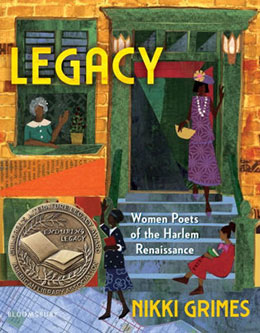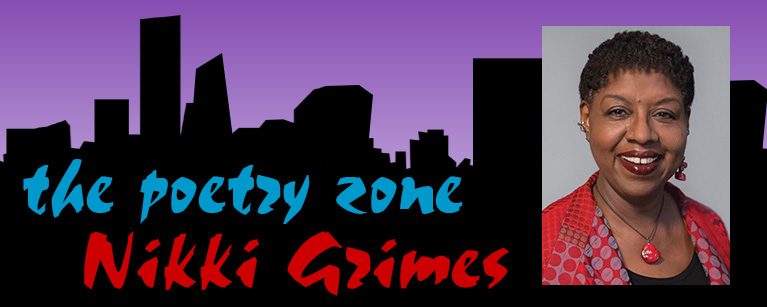
written by Nikki Grimes
illustrated by today’s most original,
female, African-American artists
Bloomsbury Children’s Books, 2021
Buy this book:
hardcover
e‑book
Legacy
Women Poets of the Harlem Renaissance
About the Book
For centuries, accomplished women — of all races — have fallen out of the historical records. The same is true for gifted, prolific, women poets of the Harlem Renaissance who are little known, especially as compared to their male counterparts.
In this poetry collection, bestselling author Nikki Grimes uses “The Golden Shovel” poetic method to create wholly original poems based on the works of these groundbreaking women-and to introduce readers to their work.
Each poem is paired with one-of-a-kind art from today’s most exciting female African-American illustrators, including: Vanessa Brantley-Newton, Cozbi Cabrera, Pat Cummings, Nina Crews, Laura Freeman, Jan Spivey Gilchrist, Ebony Glenn, April Harrison, Ekua Holmes, Keisha Morrison, Daria Peoples-Riley, Andrea Pippins, Shadra Strickland, and Elizabeth Zunon.
Legacy also includes a foreword, an introduction to the history of the Harlem Renaissance, author’s note, and poet biographies, which make this a wonderful resource and a book to cherish.
Awards and Recognition
- Bank Street College Best Children’s Books of 2022
- Booklist starred review
- Bookpage Best Book of 2021
- Books for a Global Society 2021–2022
- Bulletin of the Center for Children’s Books starred review
- CCBC Choices 2022
- Chicago Public Library Best Book
- Indie Next! selection
- King County Library System Best Book 2021
- Kirkus Prize Finalist
- Kirkus Reviews starred review
- Mighty Girls Best Book of the Year 2021
- NCTE Best Poetry Book 2022
- New York Public Library Best Book
- Publishers Weekly starred review
- Rise, A Feminist Book Project for Ages 0–18
- School Library Journal Best Book of 2021
- School Library Journal starred review
Resources
- “Contemporary Fiction Views: Because We Deserve Them,” bookgirl, Daily Kos, 19 Jan 2021
- “Kamala Harris Sworn in as First Female Vice President in United States’ 244-Year History,” A Mighty Girl staff, A Mighty Girl, 20 Jan 2021
- “Meet Your New President! 6 Books Introduce Kids to Biden, Harris … and Champ and Major, Too!” Alison Slater Tate, The Today Show, 21 Jan 202
Reviews
This collection of golden shovel poems, a form that takes a striking line from one poem and uses it to create a new poem, builds on the work of women poets during the Harlem Renaissance. As the title suggests, Grimes builds on the legacy of oft unsung voices, such as Alice Dunbar-Nelson, Mae V. Cowdery, and Angelina Weld Grimké, in a three-part exploration of heritage, the Earth, and visibility. There is much to chew on here as readers take in each poem and contemplate the relationship between the originals and Grimes’ own remarkable takes on each work. Adding more depth to this collection, each poem is amplified in its message with illustrations from artists such as Vashti Harrison and Laura Freeman. With a wide array of mediums from highly textured collage work to digital watercolors, the art here is unified in its emphasis on portraying the beauty and uniqueness of Black girls and women. Included at the end is a resources section that offers poet and artist biographies to deepen readers’ connections with the works. Whether you read this collection in full or in part or use it as a springboard for your own shot at some golden shovel poetry, this unique title is sure to spark thought and touch hearts. (Booklist, starred review)
This sister to the poet’s previous compilation One Last Word (BCCB 12/16) assembles nineteen poems from Harlem Renaissance writers and interweaves them with Grimes’ responses, employing the Golden Shovel format, wherein a selected phrase from the source poem becomes concluding line words in the new. The result is a compelling dialogue with the past that elevates weaker poems and showcases strong ones, taking readers beyond the more familiar Jessie Redmon Fauset and Angelina Weld Grimké to lesser-known names. Jessie Redmon Fauset’s pastoral ‘Rondeau’ is answered with Grimes’ ebullient city-girl tale in ‘Tara Takes on Montclair’; Esther Popel’s lacerating ‘Flag Salute’ inspires Grimes’ plaintive ‘A Mother’s Lament.’ Nineteen artists provide illustrations, ranging from sunny collage to stylized silkscreen-like images to flowing painterly interpretations. This is ready-made for the language arts curriculum, but the poetic and artistic play with source material could inspire creative youngsters on their own as well. A vibrant introduction conveys the breadth and interconnectedness of the Harlem Renaissance writing and publishing scene; a note explains the unusual poetic form; end matter includes spirited and detailed biographies of the poets (‘The world was not ready for Angelina Weld Grimké’), biographies of the contributing artists, sources for the poetry, and an index. (Bulletin of the Center for Children’s Books, starred review)
Grimes spotlights the work of lesser-known Black women poets of the Harlem Renaissance. The book begins with an explanation of the Harlem Renaissance and Golden Shovel poems. The collection is divided into three parts: ‘Heritage,’ ‘Earth Mother,’ and ‘Taking Notice.’ Golden Shovel poetry uses ‘a short poem in its entirety, or a line from the poem, called a striking line.’ The poem or striking line is then used ‘to create a new poem using the words from the original.’ Most of Grimes’s poems incorporate lines of text or the entirety of a short poem into each verse. The text of the featured poet, which is used to create the new poem, is highlighted in bold type. The juxtaposition of Grimes’s poetry and the original works provide a compelling reflection on gender, race, politics, and everyday life. Full-page, vibrant illustrations rendered by a variety of artists are included throughout, such as a woman whose head is a volcano for Lucy Ariel Williams’s ‘Prelude’ and ‘Slow Burn’ by Grimes. Educators should note that the poem ‘Flag Salute’ by Esther Popel describes lynching. Back matter includes brief biographies of the poets and artists, an index, and a list of sources. VERDICT A striking collection of voices, who examine and celebrate the experience of Black women from the past and present. An excellent introduction to Black women writers who were ignored by history. (School Library Journal, starred review)
In this expansive introduction to Harlem Renaissance women poets, Grimes utilizes the Golden Shovel poetry technique, which Terrance Hayes conceived in homage to Gwendolyn Brooks, wherein one takes ‘a short poem in its entirety, or a line from the poem… to create a new poem using the words from the original.’ The result is a thoroughly contemporary, compassionate collection in three parts (‘Heritage,’ ‘Earth Mother,’ and ‘Taking Notice,’) that juxtaposes the work of poets—including Mae V. Cowdery, Alice Dunbar-Nelson, and Esther Popel—with Grimes’s innovative feminist remixes. Acclaimed Black women artists—such as Vanessa Brantley-Newton, Cozbi Cabrera, and Vashti Harrison—illustrate, making for an abundantly layered landscape of Black female experiences. Front matter includes a preface and introductions to the Harlem Renaissance and the poetic form; back matter includes an author’s note, poet biographies, sources, and an index.” (Publishers Weekly, starred review)
Grimes’ new collection of poems weaves a contemporary Black feminist impulse while recovering the underappreciated contributions of Harlem Renaissance women poets.
“Winner of both the Children’s Literature Legacy Award and the ALAN Award, Grimes continues to deliver distinctively situated, heart-filled offerings that tie together generations of Black artistic excellence aimed at incubating positive social change. Here her focus turns toward less-well-known women poets of the early 20th century, women like Georgia Douglas Johnson, Jessie Redmon Fauset, Gwendolyn Bennett, Mae V. Cowdery, Anne Spencer, Effie Lee Newsome, Esther Popel, and Alice Dunbar-Nelson. To their poems included here, Grimes adds her own. These are done in the form of the Golden Shovel, invented by poet Terrance Hayes in homage to Gwendolyn Brooks, and they brilliantly resample the words of the women’s works. All, both collected and Grimes’, decidedly emerge from the experiences and worldviews of Black women and girls. They emphasize an ethos of care for oneself, one’s communities, and the Earth together for the possibility of a brighter tomorrow. Accompanying them are contributions from an all-star cast of Black women illustrators, empowering artworks that could be at home in a museum. This book is exquisitely rendered. After more than 77 books, Grimes remains as inspired as ever, drawing on the historic strength of Black women’s brilliance to give a timely, healing mirror to a new generation of readers. The ancestors are proud.
“Black girls everywhere, this collection is salve and sanctuary.” (Kirkus Reviews, starred review)
A shout-out for Legacy from Betsy Bird, “2021 Poetry: Versification for the Masses,” A Fuse #8 Production, School Library Journal, 6 July 2021


